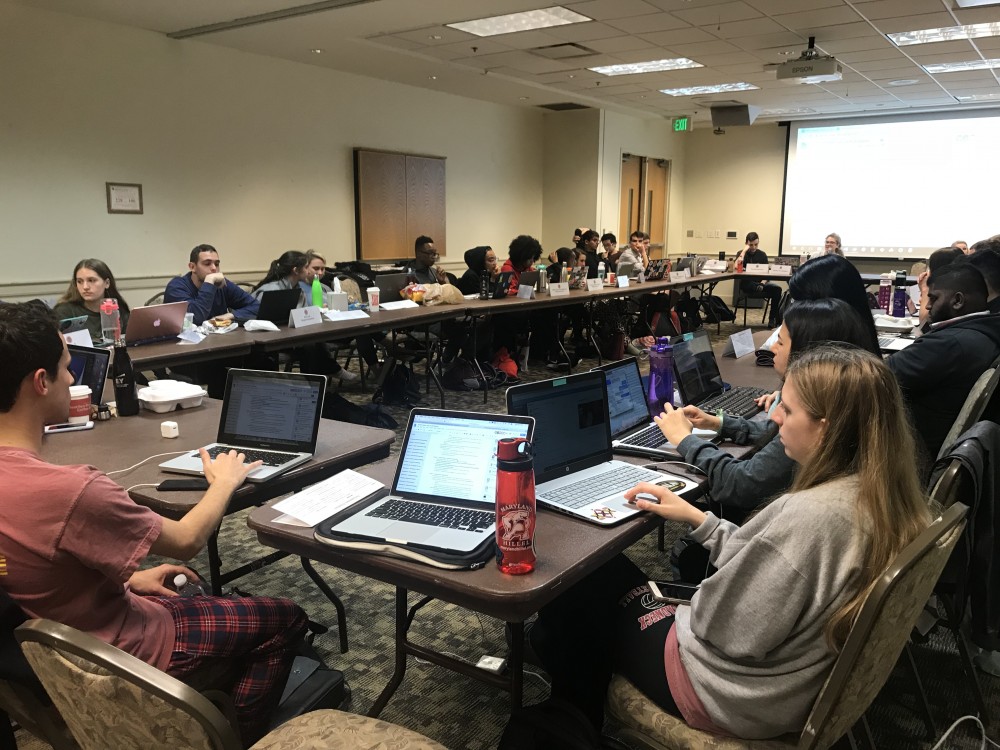By Grace Mottley and Savannah Williams
Staff writers
At its final meeting of the legislative session Wednesday night, the University of Maryland SGA voted to introduce diversity training requirements for members and make the language of its bylaws more gender-inclusive, among other actions.
Legislators debated for a total of more than eight hours at the event, the majority of which was held in Stamp Student Union. At midnight, the 32 legislators and small group of attendees migrated to Van Munching Hall and continued deliberating until about 3 a.m.
The annual omnibus meeting is the Student Government Association’s last opportunity to pass legislation before the session ends. During the meeting, the body also reviews the constitution, bylaws, standing rules of order and ethics and accountability handbook.
The meeting ended at about 3 a.m., the time at which commuter students would receive parking tickets. The legislators were pressured not to leave early because they had fulfilled quorum.
At about 2:30 a.m., Jonathan Allen, president-elect of the SGA, suggested and subsequently rescinded an amendment that would eliminate the committee on student affairs, saying the bills that went to that committee could easily be parceled out to more specific committees. He said this was not a reflection on the work ethic the legislators in that committee had.
“I’ve sat on the student affairs for all three years I’ve been on the SGA,” Allen said. “I’ve seen them do great work. … This clears it up a little and it also provides legislators an opportunity to sit on two issue-area committees.”
He said upon review, it wouldn’t work with the framework of the changes the SGA had made that night.
“This was an amendment that was tied into some of the other amendments that we didn’t, and won’t, get to tonight,” Allen said. “That’s a much longer conversation, and I don’t think we need to be here for that long.”
[Read more: The future of an SGA program to promote identity, discrimination discussions is uncertain]
Allen said he also planned to introduce an amendment that would have restructured the SGA’s executive branch, but his suggestions were not brought up for debate.
The amendment would have established a general vice president and a treasurer, a change from the current system of three vice presidents — one for financial affairs, one for student affairs and one for academic affairs. This structure would mirror that of other SGAs in the Big Ten, Allen said.
Allen did not pursue the changes because he said this was not the proper time to review them.
“To ensure that all of our time and energy was focused on amendments that would immediately impact next year, I chose to not propose them,” Allen said. “That would have been an hour-long discussion and one of the most significant changes in our governing documents since I’ve been in the organization.”
He said he’d have another chance to suggest the changes in November, when the SGA reviews its election structure for next spring.
Diversity and inclusion measures
The SGA voted to add a diversity and cultural competency training requirement for all members.
This helps ensure SGA representatives understand the diverse issues facing their constituencies, said Ja’Nya Banks, the director of the diversity and inclusion committee.
These trainings can be hosted by a variety of groups and organizations on campus, including the Office of Multicultural Involvement and Community Advocacy, the Office of Diversity and Inclusion or an outside expert.
“If we want to be representative of a diverse student body, we need to be aware of the ways policies will affect different types of constituents,” Banks said. “If you’re representing people who are outside of your cultural group, you need to be aware of things that might affect them specifically because you might not be privy to these experiences.”
[Read more: SGA won’t require legislators to serve in positions for five months before moving up]
The SGA also voted 26-5 with one abstention to change language in its bylaws from “freshman” to “first-year” to be more gender-inclusive.
“I think it’s more inclusive language,” said speaker pro tempore Leah Barteldes, who supported the change in the committee for constitution and bylaws prior to Wednesday’s meeting. “Personally, as a woman, I don’t find ‘freshman’ to be the most inclusive language.”
The opposition said this change would be unnecessarily confusing because it wouldn’t align with the Freshmen Connection designation, which can’t be changed.
The vote will not impact the language officially used by this university, but Jacob Veitch, a senior government and politics and international business major, echoed colleague Humza Yahya when he said the SGA should change the language it could.
“It’s really not our fault that the university has language that’s not inclusive,” Veitch said.
Internal changes
By a vote of 1-30 with two abstentions, the association rejected a change that would have exempted academic and residential representatives — members of the legislative branch — from serving on the academic affairs and student affairs committees, which are led by executive branch members.
Legislators are voting representatives, while those on the executive branch participate in committees. Often, legislators act in both capacities, but members of the executive board who are not legislators cannot vote on legislation.
While those in favor said it was vital to represent constituents by having legislators serve on committees, those opposed said many of the representatives don’t care about the committee itself.
“If you don’t care about the academic affairs committee,” said Veitch, the sole vote in favor, “there’s no point in being on that committee.”
Parliamentarian Reid Buskirk said forcing legislators to participate in the executive branch violates the SGA’s checks and balances system.
“By having legislators required to serve on the exec branch, it creates one large blob with no separations of power,” he said. “It’s not ethical, and it’s particularly not good practice.”
The meeting also saw a vote to discard a minimum GPA requirements for SGA members. In the past, the GPA requirement has fluctuated, Allen said, and removing this requirement eliminates further debate and confusion. The new requirement mandates that SGA members simply have “good academic and judicial standing,” in adherence with university policy.
The SGA kept the lower limit of eight members for its finance committee, but removed the cap of 15 members.
Representation
The legislature was split over a bylaws amendment that will allow legislators to concurrently serve as cabinet directors’ deputies on the executive branch. It was approved by a 14-13 vote with four abstentions.
Some raised concerns that deputies did little in their current jobs, and that these representatives could increase their participation by investing in their own cabinets rather than seeking to join the legislature.
“It’s not our fault the executive branch can’t do its job very well,” Veitch said, in opposition to the amendment. “That point is ridiculous. If your point is to get them more involved, then get them more involved.”
The SGA added a student fees liaison, a deputy director of city affairs and a dining services liaison to the committee on health and wellness.
Staff writer Brad Dress contributed to this article.
CORRECTION: Due to a reporting error, a previous version of this article stated that a bylaws amendment would enable cabinet directors’ deputies to serve on the executive and the judiciary. The amendment codified that cabinet directors’ deputies can serve on the executive and be legislative representatives. Due to an editing error, this article’s headline previously stated this was the final legislative session of the year. It was the final meeting of that legislative session. This article has been updated.



